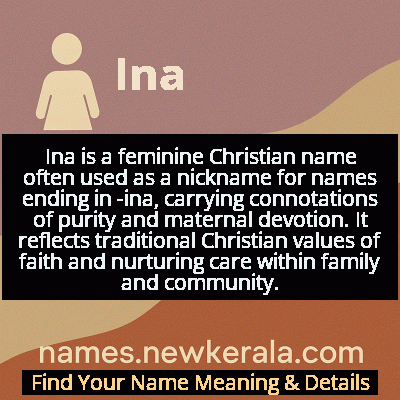Ina Name Meaning & Details
Origin, Popularity, Numerology Analysis & Name Meaning of Ina
Discover the origin, meaning, and cultural significance of the name INA. Delve into its historical roots and explore the lasting impact it has had on communities and traditions.
Name
Ina
Gender
Female
Origin
Christian
Lucky Number
6
Meaning of the Name - Ina
Ina is a feminine Christian name often used as a nickname for names ending in -ina, carrying connotations of purity and maternal devotion. It reflects traditional Christian values of faith and nurturing care within family and community.
Ina - Complete Numerology Analysis
Your Numerology Number
Based on Pythagorean Numerology System
Ruling Planet
Venus
Positive Nature
Harmonious, responsible, caring, and artistic.
Negative Traits
Overly idealistic, superficial, possessive, or jealous.
Lucky Colours
Pink, turquoise.
Lucky Days
Friday.
Lucky Stones
Diamond, turquoise.
Harmony Numbers
2, 3, 9.
Best Suited Professions
Artists, musicians, teachers, healthcare workers.
What People Like About You
Warmth, nurturing nature, artistic flair.
Famous People Named Ina
Ina Garten
Chef and Television Personality
Host of 'Barefoot Contessa' and bestselling cookbook author
Ina Ray Hutton
Singer and Bandleader
Led one of the first all-female big bands during the swing era
Saint Ina of Wessex
Queen and Religious Figure
Founded multiple monasteries and became a saint in the Catholic Church
Ina Balin
Actress
Academy Award-nominated actress known for humanitarian work
Name Variations & International Equivalents
Click on blue names to explore their detailed meanings. Gray names with will be available soon.
Cultural & Historical Significance
In modern Christian communities, Ina continues to represent traditional values and spiritual commitment. The name's simplicity and warmth make it appealing across generations, while its historical roots provide a sense of continuity with past religious traditions. Many Christian families choose Ina as either a given name or nickname to honor saints or religious ancestors, maintaining the name's sacred associations in contemporary contexts. Its cross-cultural adaptability has allowed it to flourish in various Christian denominations while preserving its core spiritual significance.
Extended Personality Analysis
Women named Ina are often perceived as nurturing, compassionate individuals with strong maternal instincts. They typically exhibit warmth and approachability, making others feel comfortable in their presence. Their personality tends to blend traditional values with practical wisdom, often serving as pillars of strength within their families and communities. Inas are frequently described as reliable and grounded, possessing an inner strength that helps them navigate challenges with grace and resilience.
These individuals often demonstrate excellent organizational skills and attention to detail, combined with creative problem-solving abilities. While generally gentle in demeanor, they can be surprisingly determined when faced with adversity, drawing on deep spiritual or emotional reserves. Their balanced nature allows them to be both caring caregivers and effective leaders when circumstances require. Many Inas develop strong intuitive abilities and emotional intelligence, enabling them to understand and support others effectively. Their combination of practicality and empathy makes them valued friends, family members, and community contributors who maintain harmony while quietly influencing positive change.
Modern Usage & Popularity
In contemporary naming practices, Ina enjoys moderate popularity as both a standalone name and affectionate nickname. While less common than its longer forms like Christina or Katharina, it has maintained steady usage particularly in Christian communities and among parents seeking short, classic names. The name experienced a slight resurgence in the early 2000s, likely influenced by celebrity chef Ina Garten's popularity and the trend toward simpler, vintage names. Current naming data shows Ina being used across diverse cultures, though it remains most popular in German-speaking countries, Scandinavia, and among families with Christian heritage. Its versatility allows it to work well in professional contexts while retaining its warm, familiar quality in personal relationships, making it appealing to modern parents who value both tradition and practicality.
Symbolic & Spiritual Meanings
Symbolically, Ina represents purity, motherhood, and spiritual devotion across Christian traditions. The name carries deep connotations of nurturing energy and protective love, often associated with maternal figures and spiritual caretakers. In Christian symbolism, it connects to concepts of innocence and steadfast faith through its historical association with Saint Agnes and other religious martyrs. The name also embodies the virtues of simplicity and authenticity, suggesting someone who values genuine spiritual connections over superficial appearances. Metaphorically, Ina symbolizes the idea of 'spiritual home' and emotional sanctuary - representing individuals who create safe, nurturing environments for others' growth and development. Its gentle phonetic qualities evoke images of comfort and reliability, while its religious heritage adds layers of spiritual significance, moral strength, and enduring faith that transcends generations.

